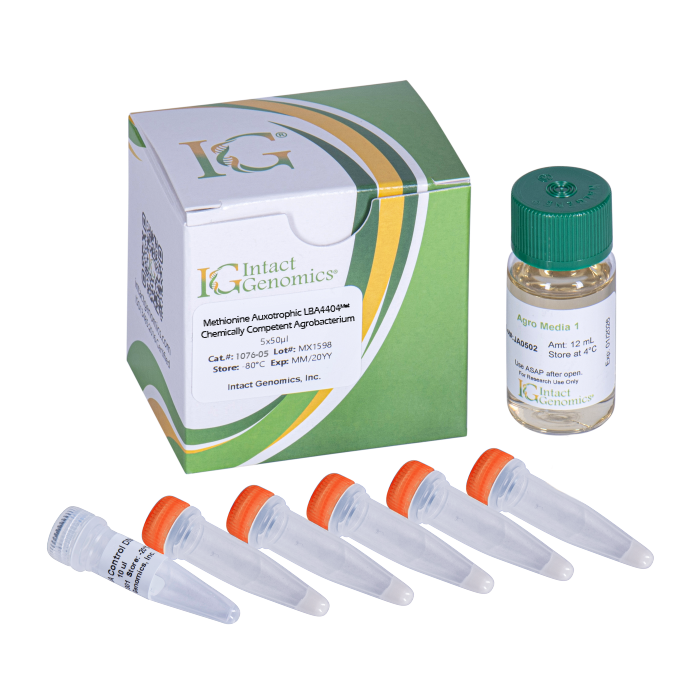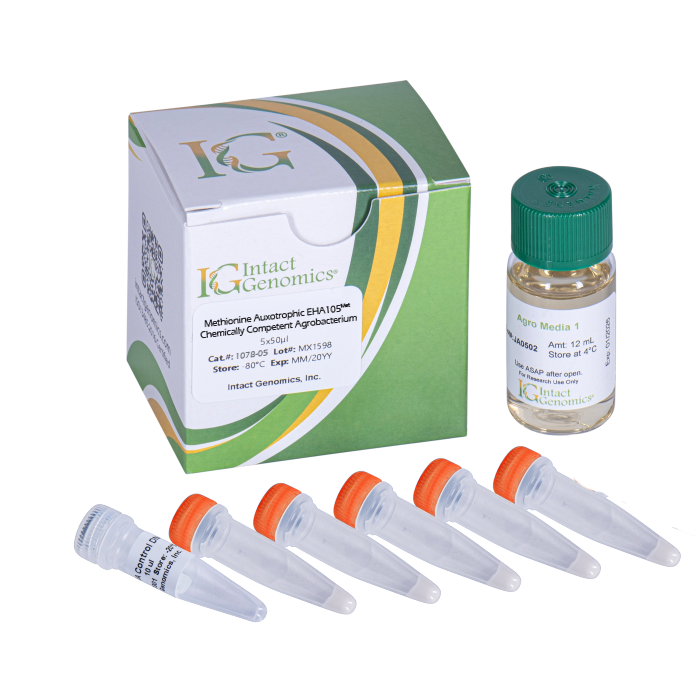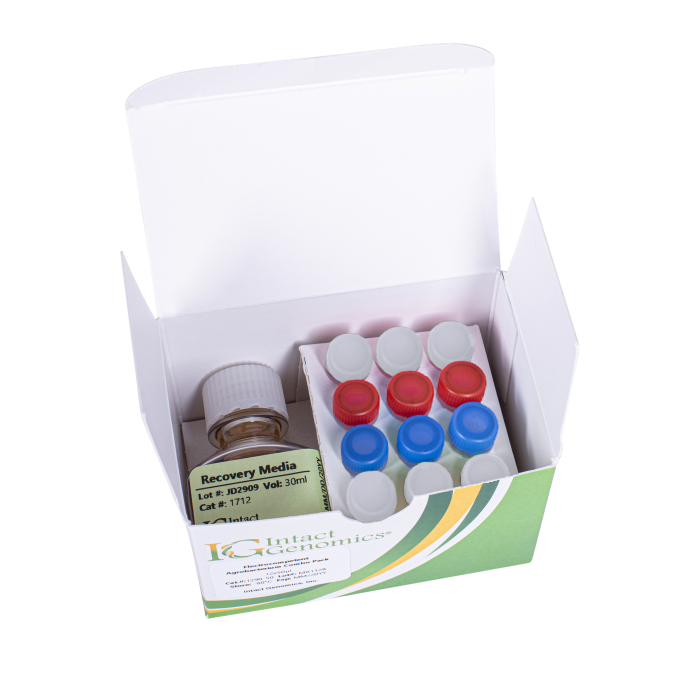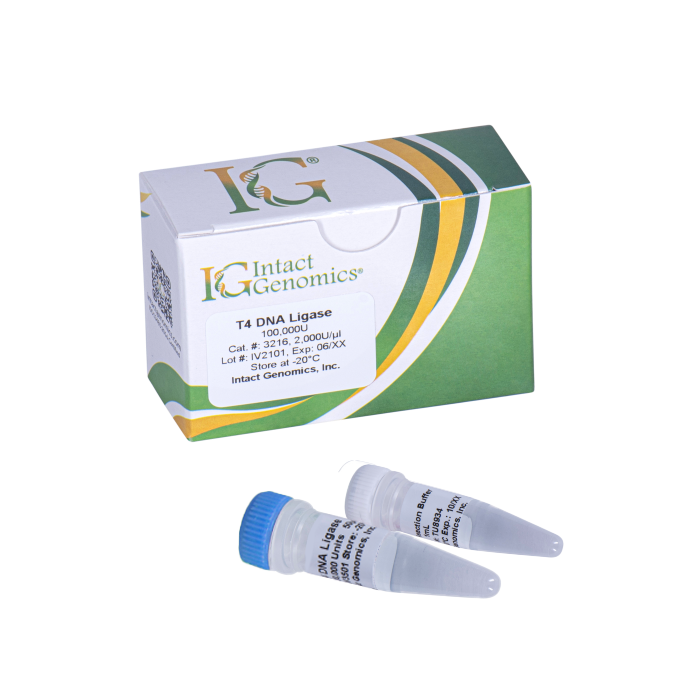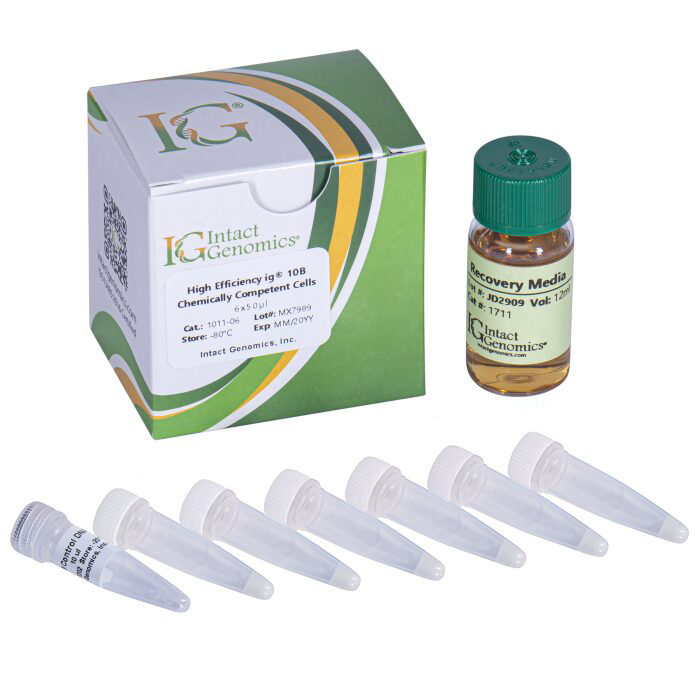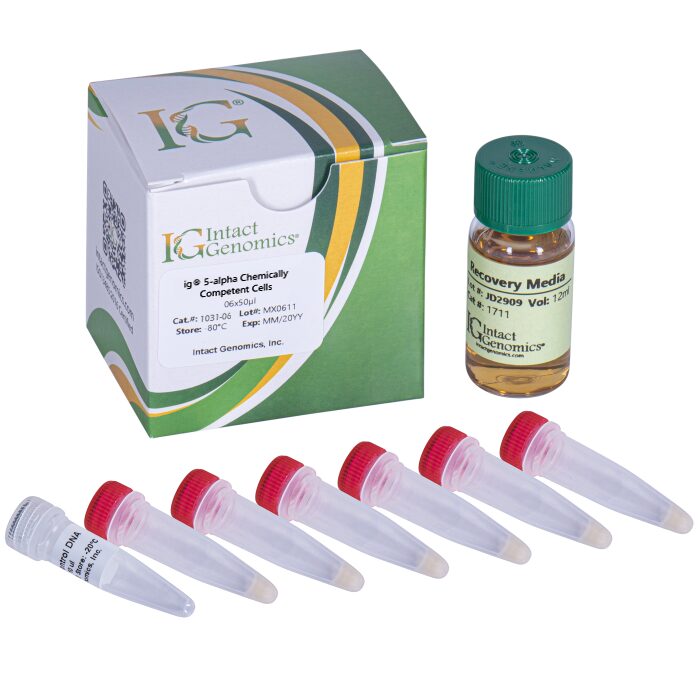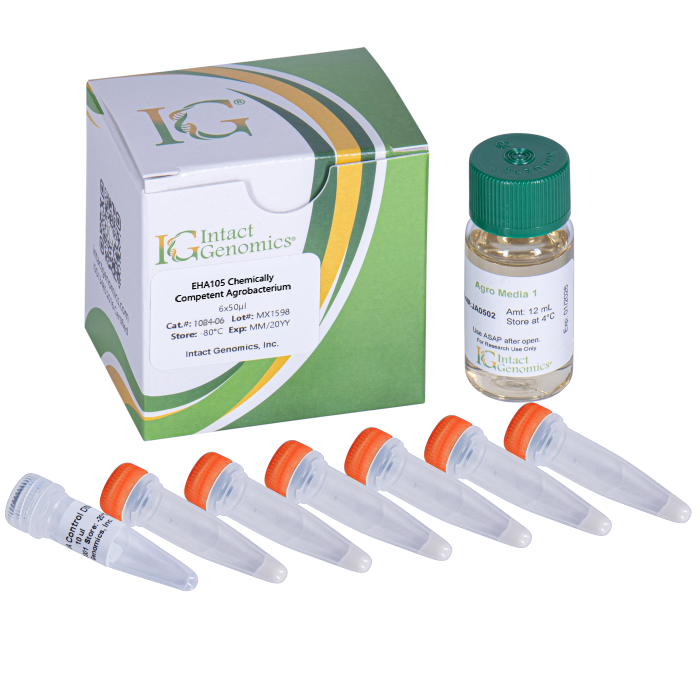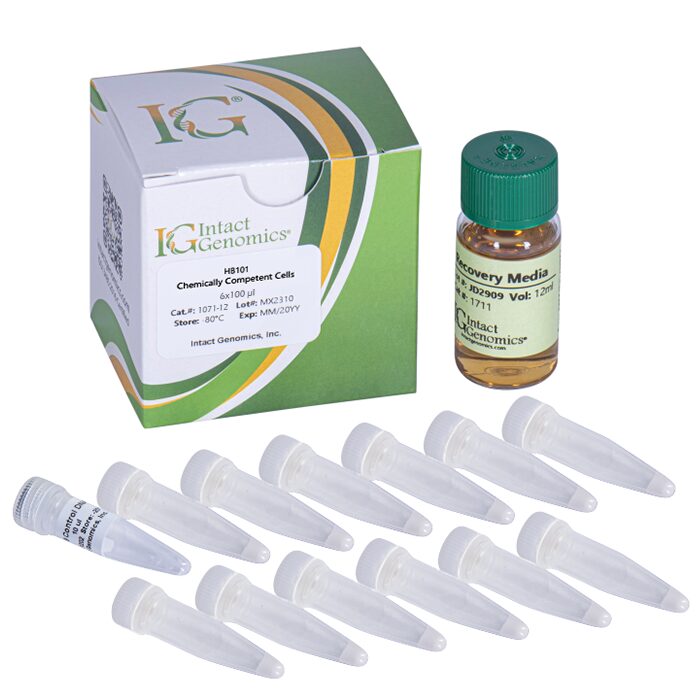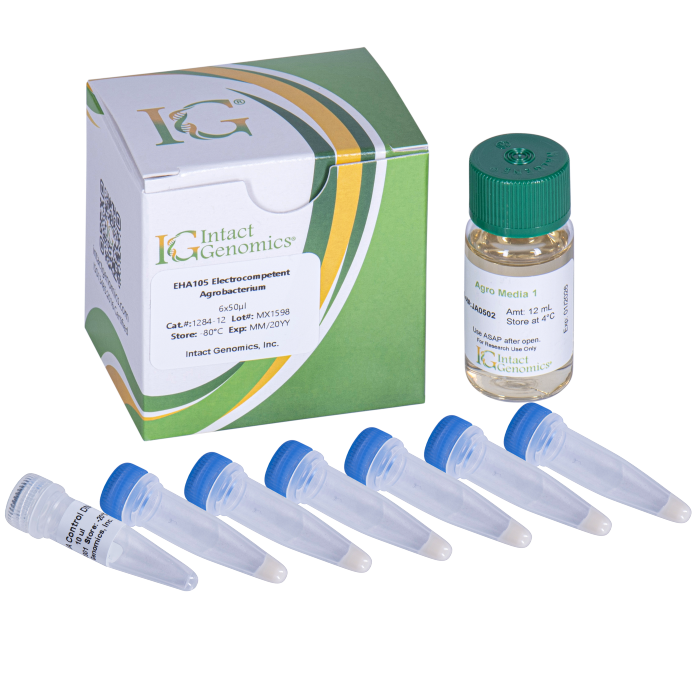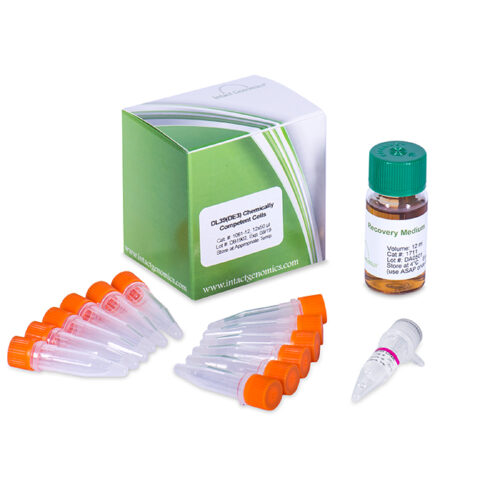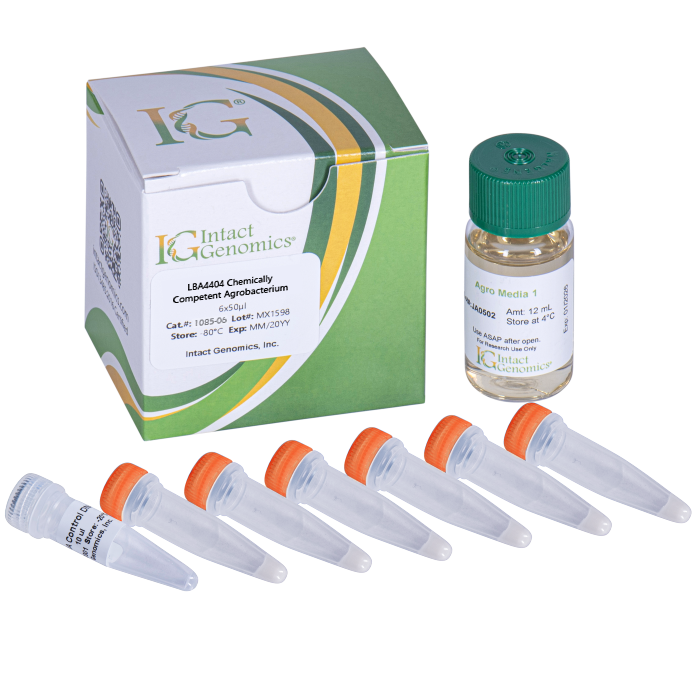Methionine-Auxotrophic LBA4404Met Agrobacterium Chemically Competent Cells reduces bacterial overgrowth during co-cultivation
Methionine Auxotrophic LBA4404Met Agrobacterium Chemically Competent Cells
Price range: $232.00 through $541.00
Description
Intact Genomics (ig®) Methionine-Auxotrophic LBA4404Met Agrobacterium Chemically Competent Cells include modifications so that they will not grow unless free methionine is added to minimal medium. This prevents the bacteria from overgrowing plant tissues when used for plant transformation. Methionine- Auxotrophic LBA4404Met Agrobacterium Chemically Competent Cells are optimized for the highest transformation efficiencies. The LBA4404Met strain is useful for transgenic operations of tomatoes, tobacco and other plants. LBA4404Met contains a rifampicin resistance gene (rif). LBA4404Met strain also contains an octopine-type Ti plasmid pAL4404Met without self-transport function, which contains the vir gene.
Custom Aliquots Available
Benefits
- Methionine Auxotrophic
- Enables development of more efficient transformation systems
- Reduced bacterial overgrowth during co-cultivation
- Decreased need for antibiotics
Specifications
Competent cell type: Chemically Competent
Species: A. tumefaciens
Format: Tubes
Transformation efficiency: ≥ 1 x 105 cfu/µg pCAMBIA1391z DNA
Shipping condition: Dry ice
Reagents Included
- ig® Methionine-Auxotrophic LBA4404Met Agrobacterium Chemically Competent Cells
- DNA (pCAMBIA1391z, 500 pg/µl)
- Recovery medium
Storage
- ig® Methionine Auxotrophic LBA4404Met Chemically Competent Agrobacterium Cells: -80 ºC
- pCAMBIA1391z control DNA: -20 ºC
- Recovery medium: 4 ºC
Quality Control
Transformation efficiency is tested by using the pCAMBIA1391z control DNA supplied with the kit and using the protocol given below. Transformation efficiency should be ≥1 x 105 CFU/µg pCAMBIA1391z DNA. Untransformed cells are tested for appropriate antibiotic sensitivity.
General Guidelines
Follow these guidelines when using ig® Methionine-Auxotrophic LBA4404Met Agrobacterium Chemically Competent Cells:
- Handle competent cells gently as they are highly sensitive to changes in temperature or mechanical lysis caused by pipetting.
- Thaw competent cells on ice and transform cells immediately following thawing. After adding DNA, mix by tapping the tube gently. Do not mix cells by pipetting or vortexing.
Example Calculation of Transformation Efficiency
Transformation Efficiency (TE) is defined as the number of colony forming units (cfu) produced by transforming 1µg of plasmid into a given volume of competent cells.
TE = Colonies/µg/Dilution
Transform 1 µl of (10 pg/µl) pCAMBIA1391z control plasmid into 50 µl of cells, add 950 µl of Recovery Medium. Dilute 10 µl of this in 990 µl of Recovery Medium and plate 50 µl. Count the colonies on the plate the next day. If you count 100 colonies, the TE is calculated as follows:
Colonies = 5
µg of DNA = 0.0005
Dilution = 100/1000=0.1
TE = 5/.0005/.1 = 1.0×105
1076-05 1076-15
Additional information
| μl | 5×50μl, 15×50μl, 6×100μl, 12×100μl |
|---|
References
Prías-Blanco, M., Chappell, T.M., Freed, E.F. et al. An Agrobacterium strain auxotrophic for methionine is useful for switchgrass transformation. Transgenic Res 31, 661–676 (2022). https://doi.org/10.1007/s11248-022-00328-4
Technical Support
Intact Genomics (IG®) is dedicated to customer satisfaction regarding the use of our products for your research needs. We test our products thoroughly to ensure they conform to the highest quality standards and provide excellent results when following the protocol’s specifications. Please follow the protocol information provided in this manual carefully and contact our customer and technical support team with any questions or comments you may have regarding this or our other products.
IG Technical Support
Email: sales@intactgenomics.com
Phone: (314) 942-3655 | Toll free: 855-835-7172
Additional Information:
The auxotrophic Agrobacterium tumefaciens strains were developed with funding from the U.S. Department of Energy’s Center for Bioenergy Innovation (CBI).
Legal Notices
Intact Genomics owns the following registered trademarks granted by the United States Patent and Trademark Office (USPTO): Intact Genomics®, IG®, ig®, igTherapeutics®, FastAmp®, i7®, DirectPlate® .
All technology protocols discussed within this manual are assumed proprietary to IG’s products, and if registered, are protected by US patent and trademark laws.
Notice to Buyer – Limited License
Buyer agrees by purchasing the product that it’s intended use is for research purposes only, not for human or diagnostic use. Purchase of this material conveys to buyer the non-transferable right to use the material purchased in research conducted by buyer, whether for teaching, non-commercial or commercial research purposes. Buyer may not sell or otherwise transfer these materials, its components, or unmodified descendants to a third party. Use of these products maybe covered by IG’s patents or trademarks.
Products are understood by buyer to be experimental in nature and may have hazardous properties. Unless prohibited by law, buyer assumes all liability for claims or damages against it by third parties that relate to or arise from the use, storage, or disposal of the purchased materials.
Buyer agrees to use the purchased materials in full compliance with applicable law and regulations. Intact Genomics will not be held liable for activities outside of itself and the products intended use.
For more information or to express legal concerns relating to patent and trademarks, please contact us at: info@intactgenomics.com or sales@intactgenomics.com
Thank you for your business!
Use this procedure to transform (ig®) Methionine-Auxotrophic LBA4404Met Chemically Competent Agrobacterium cells. Do not use these cells for Electroporation transformation.
1) Place microcentrifuge tubes on ice.
2) Remove competent cells from the -80 °C freezer and thaw completely on wet ice (10-15 minutes).
3) Aliquot 1 µl ( 10pg -1 µg) of DNA to the chilled microcentrifuge tubes on ice.
4) When the cells are thawed, add 50μl of cells to each DNA tube on ice and mix gently by tapping 4-5 times. For the pCAMBIA1391z, control, add 1 µl of (500 pg/µl) DNA to the 50 µl of cells on ice. Mix well by tapping. Do not pipette up and down or vortex to mix, this can harm cells and decrease transformation efficiency.
5) Keep tubes on ice for 5 minutes, and then transfer to liquid nitrogen for 5 minutes.
6) Incubate tubes for additional 5 minutes in 37°C water bath.
7) Immediately add 950µl of Recovery Medium or any other medium of choice to the tube, pipette up and down three times to re-suspend the cells.
8) Incubate tubes at 30 °C for 3 hours at 200 RPM.
9) Dilute the cells as appropriate then spread 20-200 μl cells onto a pre-warmed selective plate. For the pCAMBIA1391z control, you may plate 100 μl of undiluted transformation mix onto a YT plate containing 50 μg/ml kanamycin. Use sterilized spreader or autoclaved ColiRoller™ plating beads to spread evenly.
10) Incubate the plates for 2 – 3 days at 30 °C.

